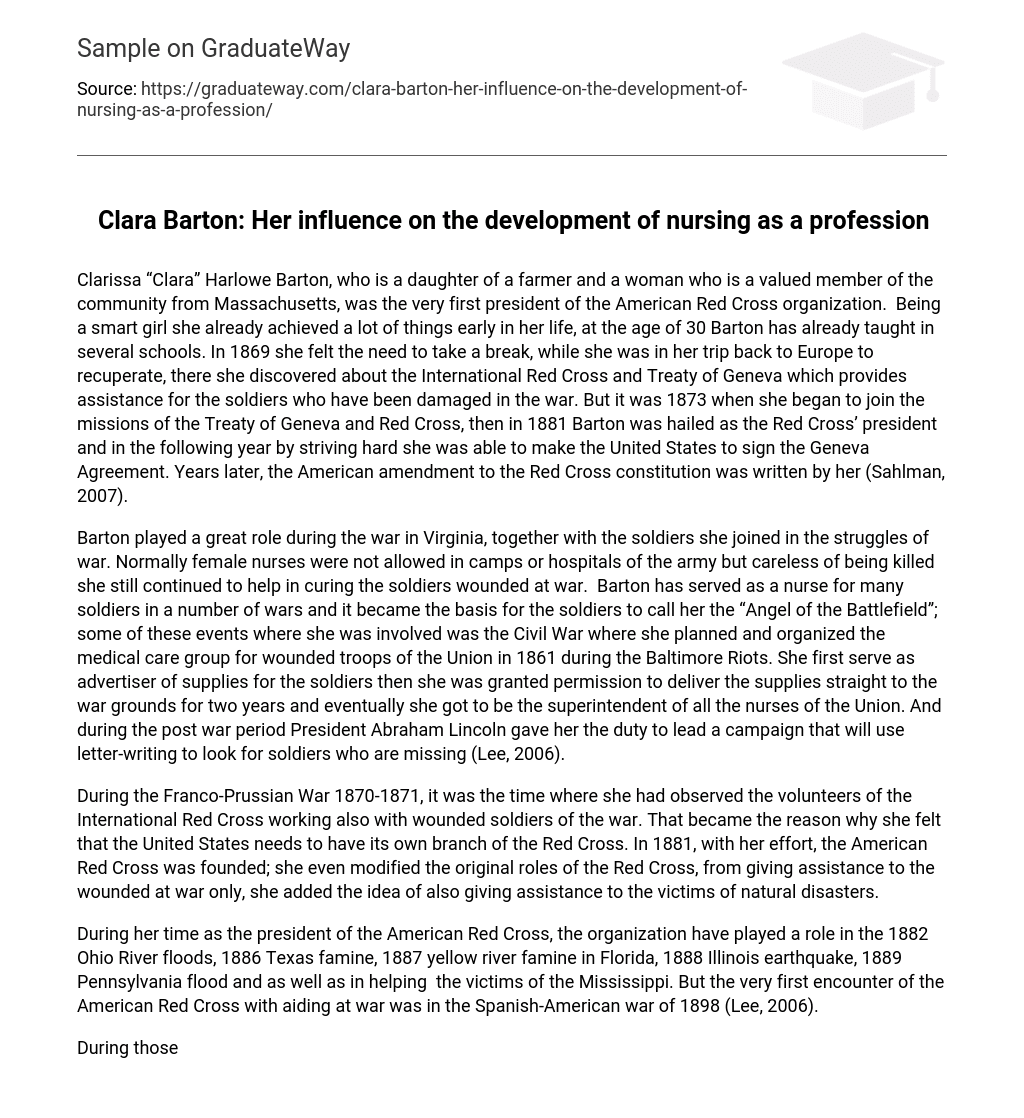Clarissa “Clara” Harlowe Barton was the first president of the American Red Cross organization. She was born in Massachusetts to a farmer and a valued member of the community. As a smart girl, she achieved many things early in life, including teaching at several schools by the age of 30.
In 1869, Barton felt the need to take a break and traveled back to Europe to recuperate. It was there that she discovered about the International Red Cross and Treaty of Geneva which provides assistance for soldiers who have been damaged in war. In 1873, she began joining missions with the Treaty of Geneva and Red Cross.
In 1881, Barton became hailed as President of the Red Cross after striving hard for it. The following year, she was able to make the United States sign onto the Geneva Agreement through her efforts. Years later, Barton wrote an amendment to the American constitution for Red Cross (Sahlman, 2007).
Barton played a great role during the war in Virginia. Together with the soldiers, she joined in the struggles of war. Normally, female nurses were not allowed in camps or hospitals of the army. However, regardless of being at risk of being killed, she still continued to help cure wounded soldiers at war.
Barton served as a nurse for many soldiers in several wars. This became the basis for soldiers to call her the “Angel of the Battlefield”. Some events where she was involved include the Civil War where she planned and organized medical care groups for wounded troops of the Union in 1861 during Baltimore Riots.
She first served as an advertiser of supplies for soldiers before being granted permission to deliver supplies straight to war grounds for two years. Eventually, she became superintendent of all nurses within Union forces.
During post-war period President Abraham Lincoln gave her duty to lead a campaign that would use letter-writing to look for missing soldiers (Lee, 2006).
During the Franco-Prussian War of 1870-1871, Clara Barton observed the volunteers of the International Red Cross working with wounded soldiers. This experience inspired her to believe that the United States needed its own branch of the Red Cross. In 1881, she founded the American Red Cross through her own efforts. She even modified its original roles which were limited to providing assistance to wounded soldiers during war; she added a new idea of also giving aid to victims of natural disasters.
During her time as the president of the American Red Cross, the organization played a role in several natural disasters such as the 1882 Ohio River floods, 1886 Texas famine, 1887 yellow river famine in Florida, 1888 Illinois earthquake, and 1889 Pennsylvania flood. They also helped victims of the Mississippi. However, their first involvement in aiding during war was in the Spanish-American war of 1898 (Lee, 2006).
During the consecutive wars of that time, nurses focused on providing proper aid to people, especially soldiers wounded in battle. However, due to Barton’s serious commitment to caring for those in need, she continued to help people even after the war ended. She constantly responded to calls for medical assistance and expanded the profession of nursing’s point of view. As a result, the word nurse” shifted its meaning from someone trained solely in immediate care to someone always ready and willing to provide aid whenever and wherever it is needed.
The nursing profession started way back in 1783. James Derham is proof of this, as he freed himself from slavery by paying for his freedom with money earned from nursing. One of the early advocates of nursing was Florence Nightingale, also known as the “Lady with the Lamp.” She committed herself to the profession since 1837 and wrote “Notes on Hospital” and “Notes on Nursing: What it is and What it is not.” She also founded the Nightingale School & Home for Nurses, which became a great help in the development of nursing. In 1886, Americans had their first nursing journal called “The Nightingale,” and that same year Spelman Seminary founded the first nursing program for African-Americans (Dolan, 1983).
In 1897, the American Nurses Association (ANA) was founded and held its first meeting in February of that year. At the time, the association was called Nurses Associated Alumnae of the United States and Canada.” Two years later, in Geneva, Switzerland, the International Council of Nurses (INC), the first international organization for healthcare professionals, was established (Ross-Kerr, 2003).
In the 1900s, several significant events occurred in the development of nursing. Dame Agnes Gwendoline Hunt founded orthopedic nursing, while in 1901, New Zealand considered regulating nurses nationally and adopted the Nurses Registration Act. The following year, Ellen Dougherty became the first registered nurse in the world. In 1909, the American Red Cross Nursing Service was created. In 1916, the Royal College of Nursing was founded with Queen Elizabeth II as its patron and most of its constituents being registered nurses (Dolan, 1983).
During the mid-20th century, the nursing profession experienced a significant acceleration in its development. Numerous associations and foundations were established by nurses, and many nursing advocates gained recognition. Since then, nursing as a profession has continued to make new advancements in various aspects while still adhering to the beliefs of early nursing advocates such as Carla Barton and Florence Nightingale regarding improving services offered to people.
References:
- Dolan, J., Fitzpatrick, M.L., Herrmann, E. (1983). Nursing in society: A historical perspective. (15th ed.). Philadelphia: W.B. Saunders.
- Lee, R.A. (July 27, 2006). Civil War: Clara Barton (1821-1912). Retrieved March 1, 2007 from http://www.historyguy.com/civilwar/barton_clara.html
- Ross-Kerr, J.C.W., M.J. (2003). Canadian Nursing: Issues and Perspectives (4th ed.). Toronto: Mosby.
- Sahlman, R. (2007). Clara Barton. Retrieved March 1, 2007 from http://www.incwell.com/Spectrum.html





